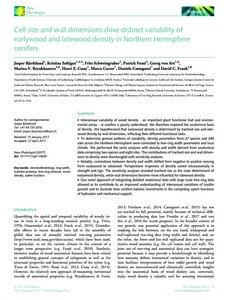Cell size and wall dimensions drive distinct variability of earlywood and latewood density in Northern Hemisphere conifers
Скачать файл:
DOI:
10.1111/nph.14639URI (для ссылок/цитирований):
http://onlinelibrary.wiley.com/doi/10.1111/nph.14639/fullhttps://elib.sfu-kras.ru/handle/2311/69691
Автор:
Jesper, Björklund
Kristina, Seftigen
Fritz, Schweingruber
Patrick, Fonti
Georg, Von Arx
Marina V. Bryukhanova
Henri E. Cuny
Marco, Carrer
Daniele, Castagneri
David C. Frank
Коллективный автор:
Институт экологии и географии
Лаборатория биогеохимии экосистем
Дата:
2017-06Журнал:
New PhytologistКвартиль журнала в Scopus:
Q1Квартиль журнала в Web of Science:
Q1Библиографическое описание:
Jesper, Björklund. Cell size and wall dimensions drive distinct variability of earlywood and latewood density in Northern Hemisphere conifers [Текст] / Björklund Jesper, Seftigen Kristina, Schweingruber Fritz, Fonti Patrick, Von Arx Georg, Marina V. Bryukhanova, Henri E. Cuny, Carrer Marco, Castagneri Daniele, David C. Frank // New Phytologist. — 2017.Текст статьи не публикуется в открытом доступе в соответствии с политикой журнала.
Аннотация:
Interannual variability of wood density – an important plant functional trait and environmental proxy – in conifers is poorly understood. We therefore explored the anatomical basis of density. We hypothesized that earlywood density is determined by tracheid size and latewood density by wall dimensions, reflecting their different functional tasks.
To determine general patterns of variability, density parameters from 27 species and 349 sites across the Northern Hemisphere were correlated to tree-ring width parameters and local climate. We performed the same analyses with density and width derived from anatomical data comprising two species and eight sites. The contributions of tracheid size and wall dimensions to density were disentangled with sensitivity analyses.
Notably, correlations between density and width shifted from negative to positive moving from earlywood to latewood. Temperature responses of density varied intraseasonally in strength and sign. The sensitivity analyses revealed tracheid size as the main determinant of earlywood density, while wall dimensions become more influential for latewood density.
Our novel approach of integrating detailed anatomical data with large-scale tree-ring data allowed us to contribute to an improved understanding of interannual variations of conifer growth and to illustrate how conifers balance investments in the competing xylem functions of hydraulics and mechanical support.

